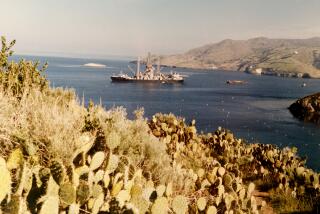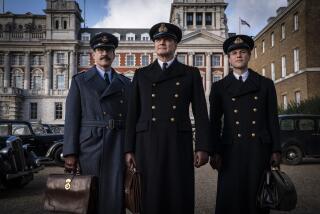Cheney, Tenet and the WMD battle
- Share via
If “The Dark Side,” the “Frontline” documentary about the joust between Vice President Dick Cheney and ex-CIA Director George Tenet, is right, then Hamlet is wrong.
The thesis of “Dark Side” is that it wasn’t conscience but access that made Tenet afraid to tell President Bush the truth as he saw it about Iraq and weapons of mass destruction.
If Tenet had told Bush that the intelligence didn’t support the Cheney-Rumsfeld view about Saddam Hussein possessing WMD, he might have found himself frozen out of the Oval Office meetings that are the nectar of power-players.
It’s a damning indictment and puts Tenet, a holdover from the Clinton administration, in the same category as Robert McNamara as men who put their careers ahead of their duty to speak truth to power, with tragic results.
“Dark Side” seems to have the goods -- interviews with White House, CIA and National Security Agency types who saw first-hand the struggle between Cheney and Tenet over control of intelligence after Sept. 11.
True, the presentation is done film-noir style with lots of hokey use of grainy black-and-white photos and breathless narration. But as an inside look at two serious men having a serious dispute over a damn serious matter, “Dark Side” could serve as a primer on how Washington really works, where ego needs and policy questions swirl in the same pot while the nation awaits the outcome.
At the end, viewers are told that Cheney and Tenet declined “requests for on-camera interviews.” Those words “on-camera” seem to suggest one, or both, made sure that their versions of events were somehow relayed to Michael Kirk, the producer, writer and director.
There is a Washington-centric aspect to “Dark Side” that is both its strength and weakness. It knows about the tabletop meetings where decisions were made, and even brings in Bob Woodward, Washington’s journalistic mandarin, to provide juicy details, including one about a celebratory party.
But some parts of its main argument don’t seem to square with facts on the ground outside Washington. To say that the CIA had to take the lead in Afghanistan because the Pentagon lacked resources in the region ignores the fact that a battalion of combat Marines was just days away from the Indian Ocean when the twin towers came down.
And the larger point of “Dark Side” -- that by turning attention in late 2001 to a possible attack on Iraq, the U.S. lost the initiative to catch or kill Osama bin Laden -- is also a tough sell.
In December of that year, Marines already in Afghanistan had a plan to use bombing, artillery and a cave-to-cave search in Tora Bora to locate Bin Laden.
As the grunts loaded onto helicopters at Kandahar, somebody gave the order to stand down -- whether it was U.S. Central Command, the Pentagon or the White House perhaps could be the subject of future documentaries. The most likely explanation is that a political decision was made that it was better for the Afghans to get Bin Laden than the Americans.
“Dark Side” is a high-drama tale of power and influence and the corrupting influence it may have had on Tenet, who has since left the CIA and kept his own counsel.
David Kay, the top U.S. weapons hunter whose report in January 2004 about the lack of WMD in Iraq provoked congressional hearings, provides the toughest assessment of him.
“He traded integrity for access,” Kay said. “That’s a bad bargain any time in life. It’s particularly a bad bargain if you’re running an intelligence agency.”
*
‘Frontline: The Dark Side’
Where: KCET
When: 9 to 10:30 tonight
Rating: not rated
More to Read
Only good movies
Get the Indie Focus newsletter, Mark Olsen's weekly guide to the world of cinema.
You may occasionally receive promotional content from the Los Angeles Times.










